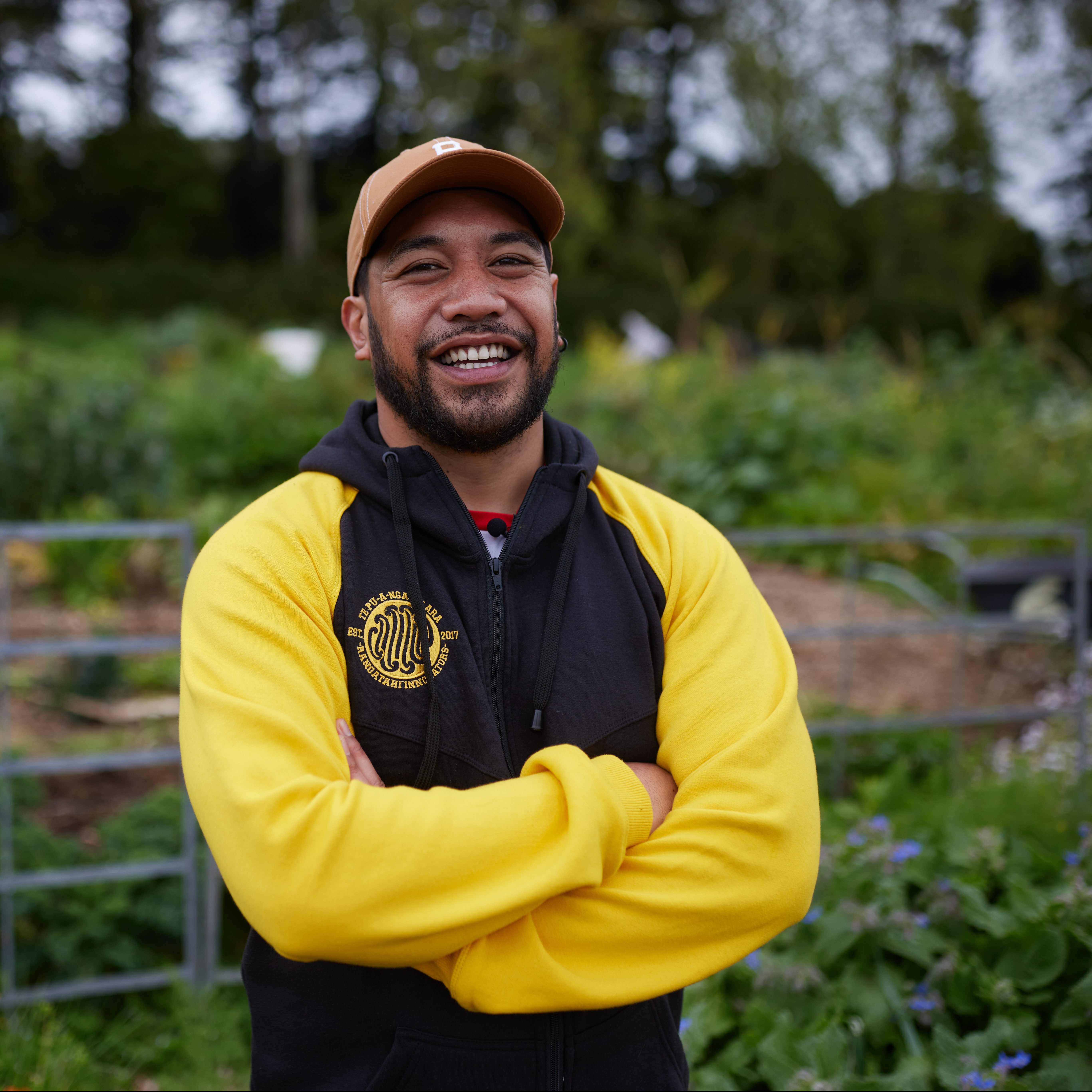Carlos Hotene
You might have seen video footage of Carlos Hotene, swerving and jinking past would-be tacklers on rugby league fields both here and overseas.
But you probably haven’t seen the quiet mahi he puts in at home, building a sustainable future for his marae and feeding the people of Mangere.
From a young age, Carlos dreamed of growing up to be a professional sportsman. He achieved that goal, working his way through the ranks of rugby league until he earned a two-year contract with the Cronulla Sharks in Sydney.
Eventually, it was time to come home.
“I thought I was coming back to nothing,” says Carlos.
“But I came back to 2.4 acres of māra kai and food sustainability – and from there, really, it’s been all about nutrition.”
The centre of Carlos’s new life is Papatūānuku Kōkiri Marae in Māngere.
The marae pursues resilience and sustainability in all sorts of ways. The marae’s gardens produce enormous quantities of kai. Water tanks have been installed. Solar panels are planned.
Carlos describes the outside world as “ordinary” and the inside world – the world of the marae – as “extraordinary”.
Far from ordinary is Carlos’s own role in the Kai Ika Project, a mission to reduce his community’s visits to fast-food chains.
He has worked relentlessly towards this goal by personally planting over 80,000 kumara in the marae’s gardens, which have expanded in line with the increasing needs of the community.
Apart from kumara, the gardens also produce lettuce, kale, rocket, beans, chillies and herbs.
“Our process is around micro-greens, planting our seeds, building fertilisers,” says Carlos.
“We’re also picking up offcuts – fish waste – from our big fishing companies. We pick up the offcuts, we bring it back to the marae, we process them into our heads, wings, frames, and then we use the guts as a fertiliser.”
About half of the produce goes to churches, community groups, and the whanau of volunteers. Another 30 per cent goes to Ooooby (Out Of Our Own Back Yards), a social enterprise that supplies locally grown food to about 500 Aucklanders. The remaining 20 per cent is kept for seed.
According to the woman who nominated Carlos for the Blake Leader award, Zara Motutere of Te Puna, Carlos’s horticultural skills are as much figurative as they are literal.
“He plants values, grows confidence and harvests leaders,” she says.
“Carlos constantly demonstrates the characteristics of a great leader through his interactions, mahi and actions.
“He is a passionate, inspirational and driven. He is honest and open. He is kaupapa-driven, and he works hard to get the mahi done while encouraging, supporting and empowering the people he works with.”
Zara says that, in four years, Carlos personally made over 880 pickups, volunteered nearly 3000 hours of mahi and diverted over 125 tonnes of fish heads, frames and offal.
When it comes to food sustainability and waste reduction, Zara says, Carlos is not only a leader. He is also a speaker, a singer, a cook and a cleaner. In short, he works in multiple roles at all levels of the marae.
This will come as little surprise to people who know his whānau.
“My parents are a big inspiration,” says Carlos.
“My mum’s the manager here at the marae, Valerie Teraitua, and also my dad, Lionel Hotene, who’s our garden manager here.
“They’ve been here for about 11-12 years, off the smell of an oily rag, doing it from their hearts. Not expecting anything, and I guess that’s definitely rubbed off onto myself.”
Apart from his parents, Carlos is also inspired by other leaders at the marae – especially kaumātua and kuia. He finds that their mana rubs off onto himself and others, including those who are much younger.
“Our next generation are the ones that are going to be holding down the fort of this world, our planet here, looking after Mother Earth,” says Carlos.
For that reason alone, it’s “perfect that this marae is able to grow our own kai and get resources so that we’re able to feed and serve our community”.
Giving and volunteering do not pay well. However, they do bring their own rewards. Carlos has learned that blessings come from following his heart, from following his passion. His new life is one he enjoys much more than his old approach of working for money.
Every great leader must overcome challenges and, for Carlos Hotene, these can be surprisingly mundane.
“Weeding, bro,” he says.
“The challenges would probably just be weeding.”
And his future goals?
“I’m really keen to make an impact in my leadership and what I’m doing at the moment in terms of growing our next generation to be sustainable.
“It’s all from the heart,” says Carlos, “and I love it with a passion.”


